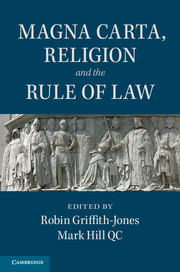Book contents
- Frontmatter
- Contents
- List of contributors
- Preface and acknowledgments
- I Introduction
- II The birth of Magna Carta and the spread of its principles
- 3 Due process in Magna Carta: its sources in English law, canon law and Stephen Langton
- 4 From Charter to common law: the rights and liberties of the pre-Reformation Church
- 5 Magna Carta and the law of nations
- 6 Magna Carta and personal liberty
- 7 Towards a new Magna Carta for early modern England
- 8 Differences over the foundation of law in seventeenth- and eighteenth-century America
- III Comparative religious approaches to Magna Carta's rule of law
- IV The contemporary inheritance of Magna Carta
- Appendix The Charters in translation
- Bibliography
- Index
4 - From Charter to common law: the rights and liberties of the pre-Reformation Church
from II - The birth of Magna Carta and the spread of its principles
Published online by Cambridge University Press: 05 May 2015
- Frontmatter
- Contents
- List of contributors
- Preface and acknowledgments
- I Introduction
- II The birth of Magna Carta and the spread of its principles
- 3 Due process in Magna Carta: its sources in English law, canon law and Stephen Langton
- 4 From Charter to common law: the rights and liberties of the pre-Reformation Church
- 5 Magna Carta and the law of nations
- 6 Magna Carta and personal liberty
- 7 Towards a new Magna Carta for early modern England
- 8 Differences over the foundation of law in seventeenth- and eighteenth-century America
- III Comparative religious approaches to Magna Carta's rule of law
- IV The contemporary inheritance of Magna Carta
- Appendix The Charters in translation
- Bibliography
- Index
Summary
Though the role of the Church in the creation of Magna Carta remains disputed, it is clear that it was crucial to its survival and transmission. This is largely because chapter 1 of Magna Carta provided a broad guarantee of the rights and liberties of the Church, a guarantee which gave the Church a vested interest in the document. Chapter 1 was something of an afterthought, as it did not appear in the Articles of the Barons from which Magna Carta emerged, and Cheney suggests it was the product of last-minute influence exercised by Langton and the bishops, though, as he comments, none of the parties concerned ‘were likely to find these words exceptionable. They had only to be proposed and they would be adopted. All could approve of the exaltation of Mother Church, coupled with the honour due to God, as an object of the Charter, each interpreting the phrase as he chose.’ This last-minute addition bred a symbiotic relationship between the Church and the Charter which shifted a number of times between the thirteenth and sixteenth centuries, from the Church's role in the preservation of the idea of Magna Carta, to its attempts to expand the range of rights and liberties guaranteed to it by the Charter or more generally by the common law, to the common lawyers’ practical and precise, if evolving, definition of its rights. Though we often focus on the tensions in the relationship between the Church and the secular authorities, whether king, Parliament or common lawyers, there is a substantial core of co-operation and consistency in the ways in which Magna Carta's consequences for the Church were interpreted in the later Middle Ages, together with a constructive ability to reflect changing circumstances.
Despite the exalted status of Magna Carta in the centuries that followed, its early days were uncertain: neither the Magna Carta of 1215 nor its three reissues were enrolled by Chancery, for example, and Cheney suggests that nobody wanted to pay the necessary fees. Two of the surviving four copies have remained in the same places since 1215: Lincoln and Salisbury Cathedrals.
- Type
- Chapter
- Information
- Magna Carta, Religion and the Rule of Law , pp. 53 - 69Publisher: Cambridge University PressPrint publication year: 2015



